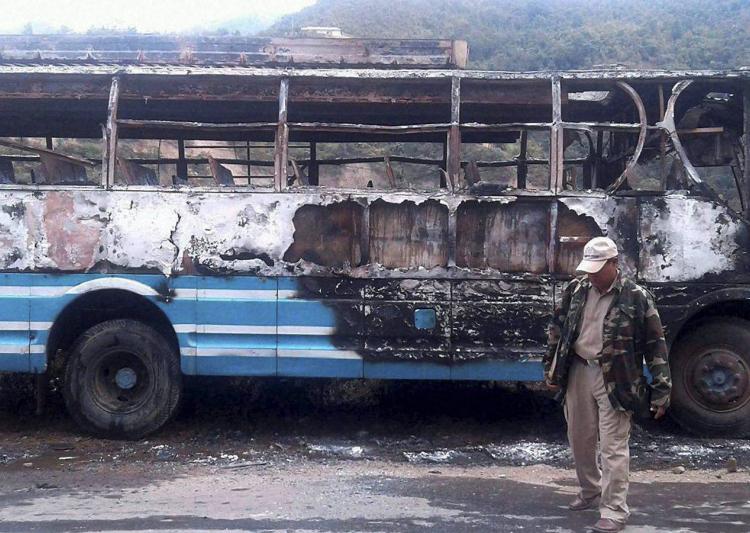Manipur In Deep Trouble
NEW DELHI: A grenade was found lying at the gates of Pandam, an evening daily in Manipur. The Chinese-made grenade carried a message from the militants claiming it to be a “new year gift for the paper of Manipur.”
The police suspect that the bomb was planted by the banned KCP-MC outfit.
A journalists organisation calling itself Editors’ Guild in Manipur, as a reaction to the threat, decided to stage a sit-in on Tuesday morning and halt all media related activities. As a sign of protest, they resolved to leave the editorial pages blank for Tuesday’s edition as stated by the president of the guild, A Mubi.
Manipur has been facing economic blockades for the past 57 days; it was started by United Naga Council (UNC), in protest of the new division of districts which split up the previously Naga Dominated districts.
The civilians have been tormented due to the closure of National highways 2 and 37- which provided supplies of fuel, medicines, and other essential items. The cost of basic necessities has escalated; one litre petrol is sold for Rs 200-300, one gas cylinder for Rs 2000-3000, one kilo of potatoes for Rs 100. Even the supply of essential medicines has been largely affected.
Most hospitals in Imphal are running short on life saving drugs- the lack of oxygen tanks and other medicines are harming the healthcare sector. Some drugs of particular companies have already been exhausted and doctors are prescribing similar combinations made by other companies.
Various counter blockades had also been imposed in the state capital against the UNC by the Meities, who blocked the vehicles carrying essentials to the Naga occupied hills, further deteriorating the existing conditions.
Manipur has been a site of internal strife for a long time now. The clashing interests of the Meities living in the Imphal valley and the Nagas and Tukis of the hills have caused continuous rifts. After the Chief Minister’s decision to make Jiribam and Sadar hills official districts, the tensions between the government and the communities were elevated. The UNC was against the decision and wanted the tribal organizations to be consulted in the process. After this, trucks were burnt down and two government offices were also set on fire.
Police officers were killed and injured during the clashes in Mid- December, while the Manipur Naga Revolutionary Force (MNRF) took responsibility for the blasts that happened in Imphal. Due to the intensifying violence, a curfew was imposed and internet services were freezed.
A delegation of Goodwill Peace Mission met with UNC on Monday discussing the hardships of the people. About dialogue with the government, UNC reportedly said that its door has always been open. The Goodwill Peace Mission, after a positive meeting, has decided to pressure the government to create an accommodating atmosphere for talks with UNC.
Apparently, the Naga Students’ Federation (NSF) has taken back the blockade of all Manipur-bound vehicles. Around 500 trucks have gone from Jiribam to the state capital Imphal under tight security- including 43 LPG tankers, 47 petrol tankers, 84 diesel tankers, 10 trucks with rice, 55 truck carrying cement and three trucks with medicines while the rest are carrying essential items. But, reportedly 700 trucks are still stranded in Jiribam, after the state government stopped the escort operations of trucks due to the ambush on Imphal-Moreh road and Noney on November 15, along NH37.
The Joint Action Committee under the aegis of Meetei Youth for Human Rights Organisation of Assam (MYHRA) has also taken back the counter economic blockade plan in Assam after considering NSF’s decision.
The central government recently rushed additional 4000 paramilitary forces to try to open the National highway. Now, there are 17,500 central security personnel present in the state to maintain law and order. The current situation has also been called a “humanitarian crisis”.
Blockades and Bandhs are not new ways of protest; in 2004-05, the state saw 60 days of blockade in total, in 2005-06, it saw 97 and in 2006-07, it saw 77. The obstinate disputes of ethnicity, identity and territory dominate with each ethnic group having its own set of demands centering around territory and integration.





